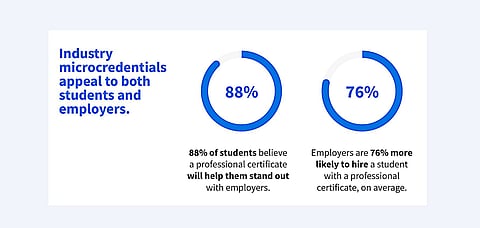
- NEWS
- the EDIT
- COMMENTARY
- BUSINESS
- LIFE
- SHOW
- ACTION
- GLOBAL GOALS
- SNAPS
- DYARYO TIRADA
- MORE

The 21st-Century jobs require new skillsets not offered by traditional universities challenging educational institutions to embark on extensive reform and improve their curriculum to prepare students for the needed competence.
In an interview with the Daily Tribune, Raghav Gupta, managing director for Asia Pacific of multi-disciplinary online education platform Coursera, said the 21st – century learners must acquire broader skills such as the 4Cs – Communication, Critical thinking, Creative, and Collaboration.
"This is a period of massive change because of the pandemic. What we have heard consistently, and it was collaborated by a survey that we did, is that students would like to have micro course certificates (to supplement their education).
"And on the employers' side, 94 percent are hiring based on a skillset requirement. But they are not telling us that a four-year course is unimportant."
The Coursera showed universities and colleges around the world leverage entry -level professional certificates, also known as industry micro-credentials, and career -relevant skills training in their degree programs to improve student recruitment and graduate employability.
To understand this phenomenon, Coursera surveyed over 2,400 students, recent graduates, and 1,200 employers across eight countries, including Australia, India, France, Germany, Mexico, Turkey, the UK, and the US, in collaboration with the market research firm, Dynata. In each country, we explored the motivations, needs, and challenges of students pursuing a degree and employers seeking to hire them.
Among other compelling data points, we found that 88% of students and recent graduates said including industry micro-credentials, or in this case, entry-level professional certificates, in an academic program would make them more likely to enroll in that program.
Key findings
Students and recent graduates globally believe industry micro-credentials make them more likely to land a job.
Forty-three percent identified their ability to get a job among the top three factors motivating their decision to enroll in a degree program. Employability was ranked ahead of academic strength, reputation, and cost and came second only to the institution's location.
Over half struggle to decide what career to pursue (55 percent) and understand what employers are looking for (50 percent).
Eighty-nine percent agree or strongly agree that earning an entry-level professional certificate will help them stand out to employers and secure jobs when they graduate.
Industry micro-credentials help to hire decision-makers to solve their top two challenges: identifying and validating applicants' skills.
When hiring recent university graduates, 42 percent of employers reported difficulty sourcing candidates with the specific skills needed for the job, and 36 percent struggled to verify that candidates have the right level of skills proficiency.
Employers both recognize and value industry micro-credentials: they are, on average, 76 percent more likely to hire a candidate who has earned one.
Ninety-two percent of employers either agree or strongly agree that a professional certificate strengthens a candidate's application.
These global trends are primarily reflected in country-specific data. Among students and recent graduates surveyed in the U.S., 86 percent agreed that earning an industry micro-credential will help them stand out to employers and get a job after graduation.
Eighty-one percent believe that micro-credentials will help them succeed once hired.
Seventy-four percent said that including relevant micro-credentials would influence their choice of a degree program at their university.
Sixty-six percent said the credential "counting as credit toward a degree" was their highest motivating factor. In comparison, 43 percent ranked it "being offered by an industry-leading company" at the top.
The Covid-19 pandemic accelerated the demand for micro-credentials that exploded in importance and highlighted the need for students to upskill and reskill to meet the changing demands of 21st-Century jobs.
Education experts must meet this trend so the Philippines will be included.
